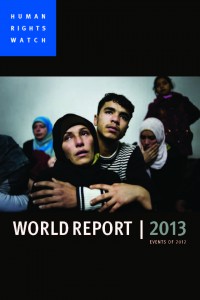World Report 2013: Burma
By Human Rights Watch • February 1, 2013 Burma’s human rights situation remained poor in 2012 despite noteworthy actions by the government toward political reform. In April, opposition leader Aung San Suu Kyi and her National League for Democracy party won 43 of 44 seats it contested in a parliamentary by-election; the parliament consists of 224 seats in the upper house and 440 in the lower house, the majority of which remain under the control of military representatives or former military officers.
Burma’s human rights situation remained poor in 2012 despite noteworthy actions by the government toward political reform. In April, opposition leader Aung San Suu Kyi and her National League for Democracy party won 43 of 44 seats it contested in a parliamentary by-election; the parliament consists of 224 seats in the upper house and 440 in the lower house, the majority of which remain under the control of military representatives or former military officers.
President Thein Sein welcomed back exiles during the year, and released nearly 400 political prisoners in five general prisoner amnesties, although several hundred are believed to remain in prison. Freed political prisoners face persecution, including restrictions on travel and education, and lack adequate psychosocial support. Activists who peacefully demonstrated in Rangoon in September have been charged with offenses. In August 2012, the government abolished pre-publication censorship of media and relaxed other media restrictions, but restrictive guidelines for journalists and many other laws historically used to imprison dissidents and repress rights such as freedom of expression remain in place.
Armed conflict between the Burmese government and the Kachin Independence Army (KIA) continued in Kachin State in the north, where tens of thousands of civilians remain displaced. The government has effectively denied humanitarian aid to the displaced Kachin civilians in KIA territory. In conflict areas in Kachin and Shan States, the Burmese military carried out extrajudicial killings, sexual violence, torture, forced labor, and deliberate attacks on civilian areas, all which continue with impunity. Ceasefire agreements in ethnic conflict areas of eastern Burma remain tenuous.
Deadly sectarian violence erupted in Arakan State in June 2012 between ethnic Arakanese Buddhists and ethnic Rohingya Muslims, a long-persecuted stateless minority of approximately one million people. State security forces failed to protect either community, resulting in some 100,000 displaced, and then increasingly targeted Rohingya in killings, beatings, and mass arrests while obstructing humanitarian access to Rohingya areas and to camps of displaced Rohingya around the Arakan State capital, Sittwe. Sectarian violence broke out again in 9 of the state’s 17 townships in October, including in several townships that did not experience violence in June, resulting in an unknown number of deaths and injuries, the razing of entire Muslim villages, and the displacement of an additional 35,000 persons. Many of the displaced fled to areas surrounding Sittwe, where they also experienced abuses, such as beatings by state security forces.
Despite serious ongoing abuses, foreign governments—including the United States and the United Kingdom—expressed unprecedented optimism about political reforms and rapidly eased or lifted sanctions against Burma, while still condemning the abuses and violence.
Read the full chapter on Burma here.
Tags: Human Rights WatchThis post is in: Human Rights, Spotlight
Related PostsBurma: US Should Retain Key Sanctions
Burma: US Should Retain Key Sanctions
“A Gentleman’s Agreement”
Committing to Women’s Rights During Burma’s Peace Process
UN Human Rights Council: High Commissioner’s reports on human rights of Rohingya Muslims and other minorities in Burma/Myanmar and on Sri Lanka









 All posts
All posts